英语试题同步练习题考试题教案初二英语下12
英语教案-初二英语第十二单元教案
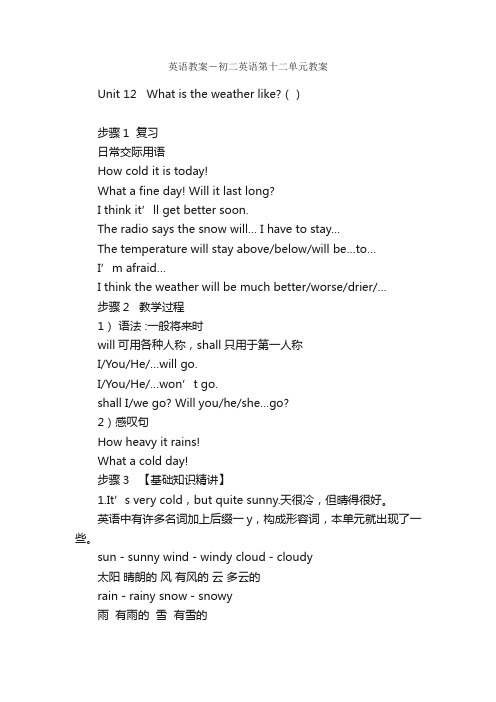
英语教案-初二英语第十二单元教案Unit 12 What is the weather like?()步骤1 复习日常交际用语How cold it is today!What a fine day! Will it last long?I think it’ll get better soon.The radio says the snow will… I have to stay…The temperature will stay above/below/will be…to…I’m afraid…I think the weather will be much better/worse/drier/…步骤2 教学过程1)语法 :一般将来时will可用各种人称,shall只用于第一人称I/You/He/…will go.I/You/He/…won’t go.shall I/we go? Will you/he/she…go?2)感叹句How heavy it rains!What a cold day!步骤3 【基础知识精讲】1.It’s very cold,but quite sunny.天很冷,但晴得很好。
英语中有许多名词加上后缀一y,构成形容词,本单元就出现了一些。
sun-sunny wind-windy cloud-cloudy太阳晴朗的风有风的云多云的rain-rainy snow-snowy雨有雨的雪有雪的2.But the fruits here are very sweet because there is strong sunshine here.可是这里的水果非常甜,因为这里强烈的阳光。
because后接there is strong sunshine是对前面主句的原因解释,是原因状语从句,如:I am late because I missed the early bus.我迟到了,因为我错过了早班车。
新人教版八年级英语下册Unit12 教学设计2
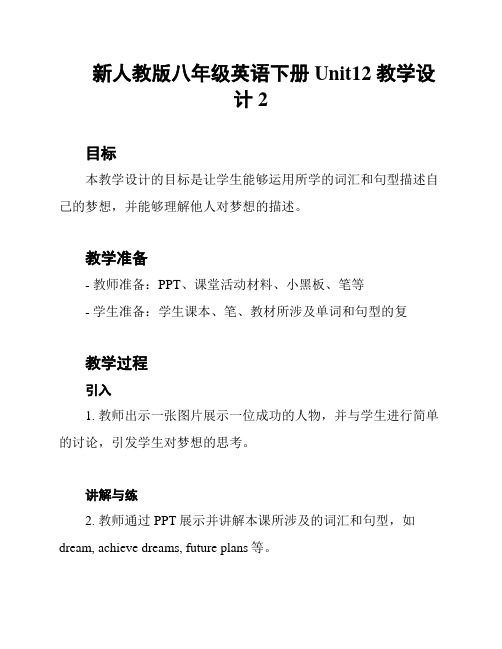
新人教版八年级英语下册Unit12 教学设
计2
目标
本教学设计的目标是让学生能够运用所学的词汇和句型描述自己的梦想,并能够理解他人对梦想的描述。
教学准备
- 教师准备:PPT、课堂活动材料、小黑板、笔等
- 学生准备:学生课本、笔、教材所涉及单词和句型的复
教学过程
引入
1. 教师出示一张图片展示一位成功的人物,并与学生进行简单的讨论,引发学生对梦想的思考。
讲解与练
2. 教师通过PPT展示并讲解本课所涉及的词汇和句型,如dream, achieve dreams, future plans等。
3. 学生进行课堂练,练描述自己的梦想,并与同桌分享。
梦想展示
4. 学生将自己的梦想写在小纸条上,并贴在教室的梦想墙上。
5. 学生自愿上台,介绍自己的梦想。
其他同学可以提问和分享自己的观点。
扩展活动
6. 设计一个小组活动,要求学生以小组为单位,合作完成一份梦想计划书。
计划书中包括每个成员的梦想以及实现这个梦想的具体步骤。
7. 小组展示他们的梦想计划书,并进行同学间的互动和评价。
总结与反思
8. 教师总结本节课的重点和学生们讨论的观点,并鼓励学生努力追逐自己的梦想。
课后作业
- 请学生回家后写一篇文章,描述自己的梦想和为实现这个梦想所采取的行动计划。
补充说明
本教学设计以学生为中心,通过多种形式的活动让学生积极参与梦想的讨论和分享。
整个教学过程旨在培养学生的语言表达能力和对未来规划的思考能力。
英语试题同步练习题考试题教案What should I do测试题
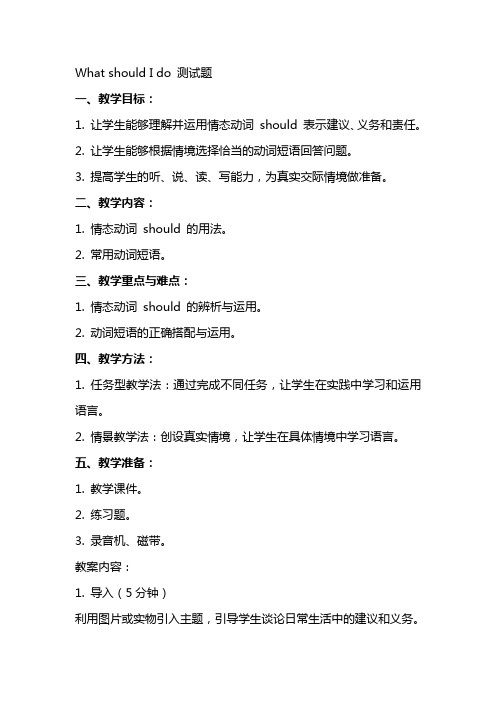
What should I do 测试题一、教学目标:1. 让学生能够理解并运用情态动词should 表示建议、义务和责任。
2. 让学生能够根据情境选择恰当的动词短语回答问题。
3. 提高学生的听、说、读、写能力,为真实交际情境做准备。
二、教学内容:1. 情态动词should 的用法。
2. 常用动词短语。
三、教学重点与难点:1. 情态动词should 的辨析与运用。
2. 动词短语的正确搭配与运用。
四、教学方法:1. 任务型教学法:通过完成不同任务,让学生在实践中学习和运用语言。
2. 情景教学法:创设真实情境,让学生在具体情境中学习语言。
五、教学准备:1. 教学课件。
2. 练习题。
3. 录音机、磁带。
教案内容:1. 导入(5分钟)利用图片或实物引入主题,引导学生谈论日常生活中的建议和义务。
2. 讲解(15分钟)讲解情态动词should 的用法,举例说明。
讲解常用动词短语,并让学生进行练习。
3. 练习(15分钟)设计不同情境的练习题,让学生选择恰当的动词短语回答问题。
4. 小组活动(10分钟)学生分组,进行角色扮演,模拟真实情境,运用所学知识进行交流。
5. 课堂小结(5分钟)总结本节课所学内容,强调情态动词should 和动词短语的正确搭配。
6. 作业布置设计课后练习题,巩固所学知识。
7. 板书设计What should I do?情态动词should 的用法常用动词短语8. 课后反思总结教学效果,针对学生掌握情况,调整教学策略。
教学评价:通过课后作业、课堂表现和小组活动,评价学生在情态动词should 和动词短语方面的掌握程度。
对学生在课堂上的积极参与和进步给予肯定和鼓励。
六、教学过程:Step 1: Lead-in (5分钟)利用图片或故事情境引起学生对问题的兴趣。
引导学生思考并讨论他们面临过的一些困难选择和决策。
Step 2: Presentation (10分钟)通过例句和情境展示情态动词"should" 的用法。
英语同步练习题考试题试卷教案Goodmorning同步练习

英语同步练习题考试题试卷教案Goodmorning同步练习一、教学目标1. 知识目标:(1)学生能够掌握日常英语对话中的基本问候语和告别语。
(2)学生能够理解和运用Good morning这一问候语。
(3)学生能够听懂并正确回答相关问题。
2. 技能目标:(1)学生能够用英语进行简单的自我介绍。
(2)学生能够与他人进行简单的日常交流。
(3)学生能够听懂并能够运用所学的词汇和句型。
3. 情感目标:(1)培养学生对英语学习的兴趣。
(2)培养学生积极向上的学习态度。
(3)培养学生与他人合作的意识。
二、教学内容1. 词汇:Good morning, morning, afternoons, evenings2. 句型:Good morning/afternoon/evening, my name is What's your name?3. 日常对话:问候语和告别语三、教学重点与难点1. 重点:(1)词汇:Good morning, morning, afternoons, evenings(2)句型:Good morning/afternoon/evening, my name is What's your name?(3)日常对话:问候语和告别语2. 难点:(1)词汇的运用:在适当的情境中使用Good morning等问候语。
(2)句型的运用:在自我介绍和与他人交流时使用正确的句型。
四、教学方法1. 情境教学法:通过模拟日常生活中的情境,让学生在实际语境中学习和运用所学的词汇和句型。
2. 交际教学法:通过学生之间的互动和交流,培养学生的口语表达能力。
3. 任务型教学法:通过完成各种任务,让学生在实践中学习和运用所学的知识。
五、教学步骤1. 热身活动(5分钟)(1)教师与学生进行简单的英语对话,引导学生复习已学的日常英语对话。
(2)学生进行简单的自我介绍,巩固自我介绍的句型。
2. 教学新词汇(10分钟)(1)教师出示词汇卡片,引导学生学习和记忆新词汇。
英语同步练习题考试题试卷教案英语下册总复习资料
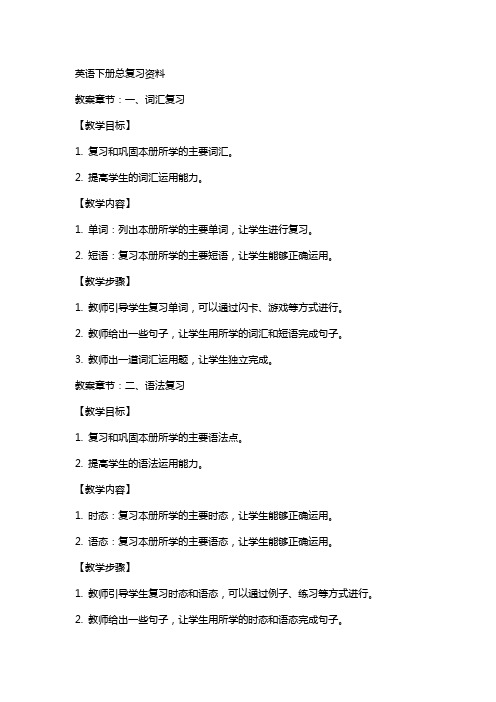
英语下册总复习资料教案章节:一、词汇复习【教学目标】1. 复习和巩固本册所学的主要词汇。
2. 提高学生的词汇运用能力。
【教学内容】1. 单词:列出本册所学的主要单词,让学生进行复习。
2. 短语:复习本册所学的主要短语,让学生能够正确运用。
【教学步骤】1. 教师引导学生复习单词,可以通过闪卡、游戏等方式进行。
2. 教师给出一些句子,让学生用所学的词汇和短语完成句子。
3. 教师出一道词汇运用题,让学生独立完成。
教案章节:二、语法复习【教学目标】1. 复习和巩固本册所学的主要语法点。
2. 提高学生的语法运用能力。
【教学内容】1. 时态:复习本册所学的主要时态,让学生能够正确运用。
2. 语态:复习本册所学的主要语态,让学生能够正确运用。
【教学步骤】1. 教师引导学生复习时态和语态,可以通过例子、练习等方式进行。
2. 教师给出一些句子,让学生用所学的时态和语态完成句子。
3. 教师出一道语法运用题,让学生独立完成。
教案章节:三、听力复习【教学目标】1. 复习和巩固本册所学的主要听力技巧。
2. 提高学生的听力理解能力。
【教学内容】1. 听力技巧:复习本册所学的主要听力技巧,如预测、关键词定位等。
2. 听力练习:复习本册所学的主要听力练习,让学生能够提高听力理解能力。
【教学步骤】1. 教师引导学生复习听力技巧,可以通过例子、练习等方式进行。
2. 教师出一道听力练习题,让学生独立完成。
3. 教师给出一段听力材料,让学生听后回答问题。
教案章节:四、阅读复习【教学目标】1. 复习和巩固本册所学的主要阅读技巧。
2. 提高学生的阅读理解能力。
【教学内容】1. 阅读技巧:复习本册所学的主要阅读技巧,如预测、寻找关键信息等。
2. 阅读练习:复习本册所学的主要阅读练习,让学生能够提高阅读理解能力。
【教学步骤】1. 教师引导学生复习阅读技巧,可以通过例子、练习等方式进行。
2. 教师出一道阅读练习题,让学生独立完成。
3. 教师给出一篇文章,让学生阅读后回答问题。
英语试题同步练习题考试题教案八年级英语下册期末考试

(此文档为word格式,下载后您可任意编辑修改!)八年级英语下册期末考试试题听力部分( 共20分 )I.听句子,选择正确的答语。
(每题1分,共5分)1. A. Happy Mother’sDay , mom! B. HappyBirthday, mom! C.How are you?2. A. She likes singinglove songs. B. Yes, shedoes. C. Ilove ’t. C. I’ll thethe the room.C. Clean the classroom.15. A. A flower.B. A kiss.C. A lived __________A. in a small London.B. in a small .C. in a small town far from London.17. Sometimes Mr Brown came back very late when the front door.B. knocked at the front doorC. opened the front door with key.18. One night ’t come into ’t find was not in. C. opened the door at last.C. His wife and child woke up at once.20. Mr Brown spoke like a small child because _________.A. she first.笔试部分 (共80分)I. 基础知识运用(每小题1分,共15分)单项选择,从A、B、C、D四个选项中,选出可以填入句子空白处的最佳选项。
1. They to New York, _______?A. D. No, you can't open it3. I a foreign company after I graduate ________ school.A. to find; fromB. finding; fromC. to find; atD. finding; at4. Some of the boys enjoy _______ football.A. playB. playingC. to playD. played5. You are _________ to return the book to the library in two weeks.A. supposedB. wantedC. shoutedD. thought6. What’s the best gift John ________ ever received?A.A. ’t seen, amB. ’t seen; wasC. didn’t see; will beD. didn’t see; was10. He doesn’t B. on C. at D. for12.Goldfish are easy _______________.A. look after B take care C to looking after D to take care of13. You must wait ______ line when you are waiting _______ a bus.A. on, inB. in, forC. in, onD. on, for14. —We are going to to the weather report?A.turn on B.turn off C.take away D.find out15. He raised ______ for the charity to .A. thousand of dollarsB. thousand of dollarC. thousands of dollarsD. thousands of dollarII. 词汇(每空1分,共10分)A). 根据句意及首字母提示,写出空白处所缺的单词。
《新目标英语》第八册Unit12教案八年级英语教案英语教案试题
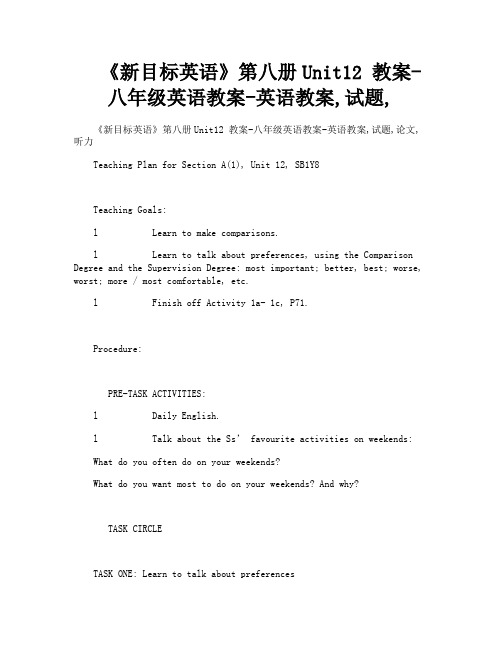
《新目标英语》第八册Unit12 教案-八年级英语教案-英语教案,试题,《新目标英语》第八册Unit12 教案-八年级英语教案-英语教案,试题,论文,听力Teaching Plan for Section A(1), Unit 12, SB1Y8Teaching Goals:l Learn to make comparisons.l Learn to talk about preferences, using the Comparison Degree and the Supervision Degree: most important; better, best; worse, worst; more / most comfortable, etc.l Finish off Activity 1a- 1c, P71.Procedure:PRE-TASK ACTIVITIES:l Daily English.l Talk about the Ss’ favourite activities on weekends: What do you often do on your weekends?What do you want most to do on your weekends? And why?TASK CIRCLETASK ONE: Learn to talk about preferencesl Lead into the new learning task by asking the Ss: Do you often go to movies?l Ss talk about movies:What kind of movies do you like best?Do you like thrillers or comedies? Why?Which cinema do you often go to watch the movies, and why?l Help the Ss learn to say:* I like most / best.* I like better than because I think.* I often go to because it’s the best cinema in our town.* Because it is closest to my house.l PAIRWORK: Ss work in pairs to talk about what they think is most important or not important for them to choose one cinema ( movie theater ).l Demonstration and evaluation.TASK TWO: Listening practicel Introduce the new task: 1b, P71. Now we’re going to listen to a conversation in which three children are talking about the movie theater they want to go. Listen and find out the characteristics of each theater: Town Cinema; Screen City; Movie Palace.l Ss listen to the tape for info. Tell the Ss that they could use only one letter to stand for the tree movie theaters: T, S and M.l Ss listen again for details:Movie TheaterQualitiesCharactersScreen CityMost popularThe biggest screenTown CinemaFriendliest serviceThe closest to homeNo new films often shownThe cheapestIt isn’t crowdedMovie PalaceThe most comfortable seatsl Ss listen for repeating.TASK THREE: SPEAKING AND WRITING PRACTICEl PAIRWORK: talk about the three movie theaters.A: What’s the most popular movie theater?B: Screen City. Because it has the biggest screens.l Demonstration and evaluations.l Listen again and let the Ss write down the tape scripts on their books.HOMEWORK:l Try to think of more places to compare with after class.l Preview Activity 2, on P72.POST-TEACHING NOTES《新目标英语》第八册Unit12 教案_八年级英语教案-英语教案,试题,论文,听力。
最新初中英语八年级下册教案及课堂同步练习试题 全册精编版

2020年初中英语八年级下册教案及课堂同步练习试题全册精编版Module 1 Feelings and impressions一、学习目标:A. 单词和短语:smell-smelled-smelled (smelt-smelt), soft, sour, mm, cookie, pizza, lovely, done, try, have a try, pie, sound, sweet tooth, salt, jam, for, favorite, ear, glasses, jeans, nervous, fair, pretty, proud, be proud of , stranger, message, sb. can’t wait, hobby, at school, in, mark, loveB. 交际用语:1. I’m afraid…2. Have a try!3. It’s my lucky day!4. It smells too strong and it tastes a bit sour.5. They taste really sweet and they feel soft in the middle.6. —Do you like bananas?—Yes, I do. They taste delicious. Do you like flowers?7. It tastes good.8. It doesn’t smell fresh.9. You look very pretty.10. I get bad marks at school, and I feel sad.11. I often feel a bit sad at first when I leave my mum and dad for a few days.12. I’m quite shy when I’m with stranger.13. I feel nervous when I speak Chinese.14. I’m always sorry when I don’t know how to do things in the right way.15. I’m afraid of flying.二. 教学目标1. Function: Describing feelings and impressions.2. Structure: Sense verbs: feel, look, sound, smell, taste, adjectives3. Skills:1) Listening for specific information; matching sentences with pictures.2) Talking about likes and dislike.3) Reading and understanding behavior of characters; finding specific information4) Writing a description of a classmate.4. Around the world: Polite expressions5. Task: Writing a description of a classmate.三、重点及难点:Sense verbs: feel, look, sound, smell, taste, adjectives四、教学设计:Unit 1 It smells delicious.ⅠTeaching modelListening and speakingⅡTeaching methodPWP approachⅢTeaching aims1. To listen and understand sentences with sense verbs.2. To understand the conversation.3. To learn to use sense verbs.ⅣTeaching Objectives1. Key vocabulary: smell-smelled-smelled (smelt-smelt), soft, sour, mm, cookie, pizza,lovely, done, try, have a try, pie, sound, sweet tooth, salt, jam, for,favorite, ear2. Key structures:Sense verbs: feel, look, sound, smell, taste, adjectivesⅤTeaching aidsTape recorder, OHP, videoⅥTeaching StepsStep 1 Warming-up1. Show some pictures to introduce the sense verbs.2. Show some pictures to introduce the new words.3. Learn the new words.Step 2 Listen and number the pictures.1. Ask the students to read the word and expressions in Activity 1.2. Ask the students to look at the pictures in Activity 1 carefully.3. Listen and number the pictures.4. Ask the students to check their answer with a partner.5. Call back the answer from the whole class and check the answer.Step 3 Listen again and complete the sentences.1. Ask the students to read the word and expressions in Activity2.1) The cookie tastes sweet.2) The milk _____________.3) This bed _____________.4) Tom ______________.2 Listen again and complete the sentences.3. Ask the students to check their answer with a partner.4. Call back the answer from the whole class and check the answer. Keys: 1. tastes sweet 2. smells sour 3. feel a bit soft 4. looks very strong Step 4 Listen and read.1. Show some pictures, and ask the students to talk about them.2. Ask the students to read the conversation silently.3. Play the recording and ask the students to listen and read the conversation.4. Read the conversation.5. Act it out.6. Learn “Everyday English”I’m afraid…Have a try!It’s my lucky day!7. Now check (√) what Betty is making in Activity 3.8. Ask the students to check their answer with a partner.9. Call back the answer from the whole class and check the answer.Step 5 Complete the sentences with the words in the box.1. Ask the students to read the words in the box in Activity 4.2. Ask the students to read through the sentences in Activity 4.1) I bought a large chocolate cake, because I love _____________ food.2) Dried fish has a _____________ taste. You don’t need much of it in the dish.3) She does not put ______________ in tea because she does not like sweet tea4) The milk has gone ______________ overnight, so we cannot drink it.5) The bed feels ________________ and comfortable.6) Apple pie sounds _____________. It is my favourite.3. Complete the sentences with the words in the box.4. Check with a partner.5. Call back the answers from the whole class.Keys: 1.sweet 2. strong 3. sugar 4. sour 5. soft 6. lovely6. Read the sentences together.Step 6 Complete the table in Activity 5.1. Ask the students to read the words in Activities1-4.2. Complete the table with the words in the boxes in Activities 1 and 4.3. Check with a partner.4. Call back the answers from the whole class.Step 7Pronunciation and speaking1. Play the recording once without stopping.2. Play the recording again and ask the whole class to repeat.1) It smells too strong and it tastes a bit sour.2) They taste really sweet and they feel soft in the middle.3. Ask the students to listen and underline the words the speaker stresses.4. Now listen again and repeat.Step 8 Work in pairs.1. Ask and answer about the things in the box.2. Say why you like or do not like them.—Do you like bananas?—Yes, I do. They taste delicious. Do you like flowers?Step 9 Grammar感官系动词:英语动词中,有的后面要接名词或代词等作宾语,有的单独作谓语,而有的后面要接形容词或名词等做主语的补充成分。
英语试题同步练习题考试题教案八年级英语下册期末考试

英语试题同步练习题考试题教案八年级英语下册期末考试(此文档为word格式,下载后您可任意编辑修改!)八年级英语下册期末考试试题时量: 100(分钟)分值:100(分)命题人: 王欢审核人: 刘毅敏听力部分( 共20分 )I.听句子,选择正确的答语。
(每题1分,共5分)1. A. Happy Mother’sDay , mom! B. HappyBirthday, mom! C.How are you?2. A. She likes singinglove songs. B. Yes, shedoes. C. Ilove ’t. C. I’ll thethe the room.C. Clean the classroom.15. A. A flower.B. A kiss.C. A lived __________A. in a small London.B. in a small .C. in a small town far from London.17. Sometimes Mr Brown came back very late when the front door.B. knocked at the front doorC. opened the front door with key.18. One night ’t come into ’t find was not in. C. opened the door at last.C. His wife and child woke up at once.20. Mr Brown spoke like a small child because _________.A. she first.笔试部分 (共80分)I. 基础知识运用(每小题1分,共15分)单项选择,从A、B、C、D四个选项中,选出可以填入句子空白处的最佳选项。
1. They to New York, _______?A. D. No, you can't open it3. I a foreign company after I graduate ________ school.A. to find; fromB. finding; fromC. to find; atD. finding; at4. Some of the boys enjoy _______ football.A. playB. playingC. to playD. played5. You are _________ to return the book to the library in two weeks.A. supposedB. wantedC. shoutedD. thought6. What’s the best gift John ________ ever received?A.8. -----Could you tell me ______ you’ve been C. D. Beiji ng, I’ve just come back.A. ’t seen, amB. ’t seen; wasC. didn’t see; will beD. didn’t see; was10. He doesn’t B. on C. at D. for12.Goldfish are easy _______________.A. look after B take care C to looking after D to take care of13. You must wait ______ line when you are waiting _______ a bus.A. on, inB. in, forC. in, onD. on, for14. —We are going to to the weather report?A.turn on B.turn off C.take away D.find out15. He raised ______ for the charity to .A. thousand of dollarsB. thousand of dollarC. thousands of dollarsD. thousands of dollarII. 词汇(每空1分,共10分)A). 根据句意及首字母提示,写出空白处所缺的单词。
八年级英语同步下册12
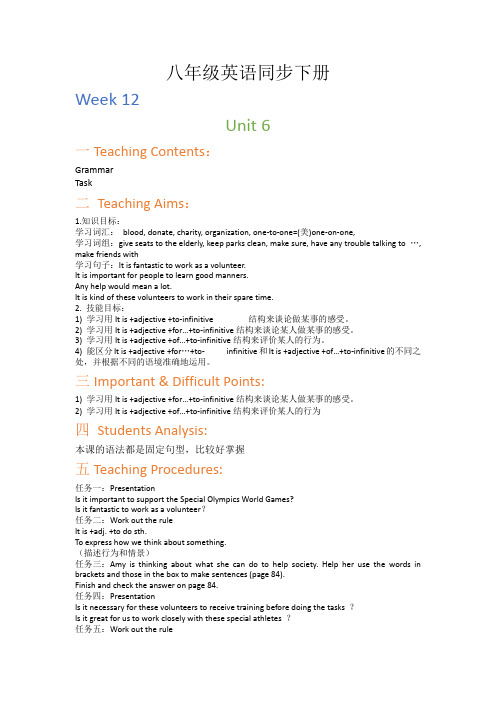
八年级英语同步下册Week 12Unit 6一Teaching Contents:GrammarTask二Teaching Aims:1.知识目标:学习词汇:blood, donate, charity, organization, one-to-one=(美)one-on-one,学习词组:give seats to the elderly, keep parks clean, make sure, have any trouble talking to …, make friends with学习句子:It is fantastic to work as a volunteer.It is important for people to learn good manners.Any help would mean a lot.It is kind of these volunteers to work in their spare time.2. 技能目标:1) 学习用It is +adjective +to-infinitive 结构来谈论做某事的感受。
2) 学习用It is +adjective +for…+to-infinitive结构来谈论某人做某事的感受。
3) 学习用It is +adjective +of…+to-infinitive结构来评价某人的行为。
4) 能区分It is +adjective +for…+to- infinitive和It is +adjective +of…+to-infinitive的不同之处,并根据不同的语境准确地运用。
三Important & Difficult Points:1) 学习用It is +adjective +for…+to-infinitive结构来谈论某人做某事的感受。
2) 学习用It is +adjective +of…+to-infinitive结构来评价某人的行为四Students Analysis:本课的语法都是固定句型,比较好掌握五Teaching Procedures:任务一:PresentationIs it important to support the Special Olympics World Games?Is it fantastic to work as a volunteer?任务二:Work out the ruleIt is +adj. +to do sth.To express how we think about something.(描述行为和情景)任务三:Amy is thinking about what she can do to help society. Help her use the words in brackets and those in the box to make sentences (page 84).Finish and check the answer on page 84.任务四:PresentationIs it necessary for these volunteers to receive training before doing the tasks?Is it great for us to work closely with these special athletes ?任务五:Work out the ruleIt’s +adj.+for sb. +to do sth.To specify (说明)who we are talking aboutComplete the conversation on Page 85:Finish and check the answer on page 85.任务六:PresentationWas it very brave of him to join the competition?It was very kind of you to help me.任务七:Work out the ruleIt’s +adj.+of sb. +to do sth.To express (表达)what we think of someone’s actionsRearrange the words below to form sentences (Part C on page 86)任务八:区别It is +adjective+of sb to do sth.与It is +adjective+for sb to do sth.任务一:RevisionWe’ve learnt about groups of people who need our help in this unit. Can you tell me who these people are and how we can help them?任务二:presentationOther people who need help.survivors of disasterschildren without familiessomeone with a serious diseasepeople in poor areasblind and deaf peoplethe elderly任务三:DiscussionWhat should we do to help them?任务四:WritingWhat are the main parts of an article?How can we organize our ideas before writing?Peter has read an article about a middle school student in the newspaper. He wants to write a letter to ask for help. He is organizing his ideas first.Introduction Who needs help?Main body Information about the person or group in need What kind of help do they need?How can we help?Conclusion Thanks for help任务五:Listen to Peter’s letter and answer the questions.1. What is wrong with Xiao Wei?2. What kind of help do his family need?3. How can we help Xiao Wei?任务六:Read Peter’s letter and answer the questions.1. How does Peter write such a letter?2. What is the main idea of each paragraph in Peter’s letter?IntroductionParagraph 1: Xiao Wei needs our help.Main body Paragraph 2: Information about Xiao Wei. Paragraph 3: Xiao Wei’s family need money. Paragraph 4: We can donate money.ConclusionParagraph 5: Thanks for your help.Before writing, it’s necessary for us to organize our ideas first. When we write a letter for help, we need to tell others two points:who needs helphow we can helpDiscuss in pairs who you want to help and what you can do. Use the following ideas to help you.Someone with a serious diseasePeople in poor areasBlind and deaf peopleThe elderlyChildren without parentsEarthquake survivorsThink about the following questions1. Who needs help?2. How do these people probably feel?3. What do these people need?4. How can we help these people?5. What can we give them?6. How can we raise money for them?7. What can we do with this money?8. What can we ask others to do for these people?9. Who should we write to?任务七:Work in groups and write a letter for help. You can use the following useful expressions to help you.Dear classmates/friends/parents/ neighboursLet me tell you a little about …... need our help.We must do something to help.I have an idea. I plan to …Please help me …You can help by …I hope you will …It will cost ... To ...... do/does not have enough money for ...It is important/dangerous/... for ... to ...If all of us can give a helping hand, ... may ...Thank you for your help/support.俗话说:“予人玫瑰,手留余香”。
八年级英语第二学期Unit12综合练习

八年级英语第二学期Unit1-2综合练习第一部分听力(20分)一.听句子,选出你所听到的单词或短语(每小题1分,共5分)( )1 A. free B. tree C. green D. cream( )2 A. look for B. look after C. look at D. look out( )3 A. don’t B. won’t C. doesn’t D. needn’t( )4 A hair B. haircut C. like D. liked( )5 A. beside B. besides C. except D. expect二.听句子,选择恰当的答语(每小题1分,共5分)( )6. A. No, he won’t B. Yes, I will.C. Yes, it will be sunny.D. No, we won’t( )7. will be cold. B. It is snowing. C. It is OK. D. It is raining.( )8. like music most.Pitt is my favorite movie star.C. I like English mostD. I like basketball most( )9. A. Sure. . C. Certainly not. D. I’m busy.( )10. A. That’s OK. B. That’s goo d.C. I’m sorry to hear that.D. Congratulations.三.听对话,选择对话后问题的正确答案(每小题2分,共10分)( )11. A. By bike. B. By bus. C. On foot. D By subway. ( )12. A. Milk. B. Water. C. Tea. D. Coffee.( )13. A Australia. B. Canada. C. America. D. China ( )14. A At 7:45 B. At 8:45 C. At 8:15 D. At 7:15( )15. A The green one B. The white one. C. The red one. D. The blue one笔试部分(80分)一.单项选择(20分)( ) 1 .What will the weather ______like tomorrow?A isB beC areD was( ) 2. There are about five ____ young trees on the hill.A hundredB hundredsC hundred ofD hundreds of( )3. Shanghai is very beautiful and I _ it.A. fall in love withB. fall in like withC. fall in love inD. feel in love with ( )4. If you want to talk to your teacher ,you should _ _first.A. called to herB. called up herC. call her upD. called her up( ) _there be more people in 10 years? No , there_ _.A Have, have n’t B. Will , won’t beC. Are , aren’tD. W ill, won’t( ) 6. Could you give me__ _?A . an advice B. some adviceC. any adviceD. some piece of advice( )7. If you want better grades , you _ _ watch so much TV.A .shouldn’tB .should C. could D. must ( )8. My friend has the same haircut _ I do.A. asB. like C . with D . than( )9. I’m very ___ because my best friend didn’t invite me to come to his party.A . popular B. happy C. late D . upset( ) are many famous predictions that never____.A. come inB. came trueC. come intoD. come out二. 根据汉语意思,完成句子。
unit2onehowdoyoustudyforatest教案鲁教版八年级下12
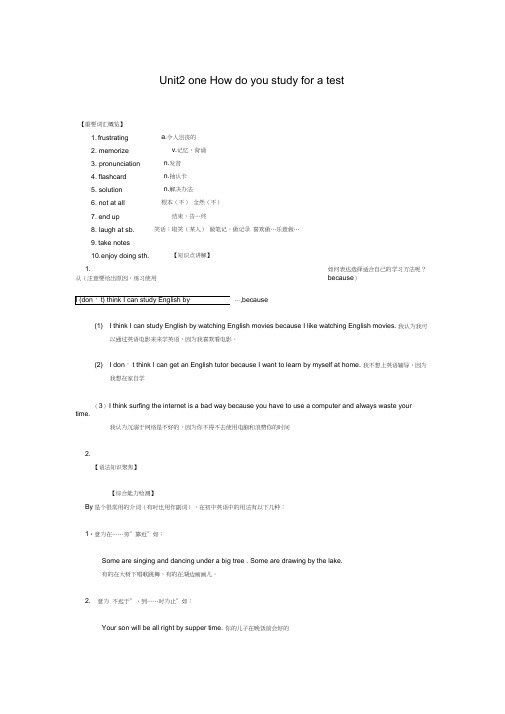
Unit2 one How do you study for a testa.令人沮丧的 v.记忆,背诵 n.发音 n.抽认卡 n.解决办法 根本(不) 全然(不) 结束,告…终 笑话;取笑(某人) 做笔记,做记录 喜欢做…乐意做… 【知识点讲解】 1.如何表达选择适合自己的学习方法呢?从(注意要给出原因,练习使用 because )(1) I think I can study English by watching English movies because I like watching English movies. 我认为我可以通过英语电影来来学英语,因为我喜欢看电影。
(2) I don ' t think I can get an English tutor because I want to learn by myself at home. 我不想上英语辅导,因为我想在家自学(3) I think surfing the internet is a bad way because you have to use a computer and always waste your time.我认为沉溺于网络是不好的,因为你不得不去使用电脑和浪费你的时间2.【语法知识聚焦】【综合能力检测】By 是个很常用的介词(有时也用作副词),在初中英语中的用法有以下几种:1•意为在……旁”靠近”如:Some are singing and dancing under a big tree . Some are drawing by the lake.有的在大树下唱歌跳舞,有的在湖边画画儿。
2. 意为 不迟于”、到……时为止”如:Your son will be all right by supper time. 你的儿子在晚饭前会好的【重要词汇概览】1. frustrating2. memorize3. pronunciation4. flashcard5. solution6. not at all7. end up8. laugh at sb.9. take notes10. e njoy doing sth.…,becauseHow many English songs had you learned by the end of last term?到上个学期末你们已经学了多少首英语歌曲?3 •表示方法、手段,可译作靠” 用” 凭借” 通过” 乘坐”等。
(整理)初中英语八年级下册教案及课堂同步练习试题 全册

Module 1 Feelings and impressions一、学习目标:A. 单词和短语:smell-smelled-smelled (smelt-smelt), soft, sour, mm, cookie, pizza, lovely, done, try, have a try, pie, sound, sweet tooth, salt, jam, for, favorite, ear, glasses, jeans, nervous, fair, pretty, proud, be proud of , stranger, message, sb. can’t wait, hobby, at school, in, mark, loveB. 交际用语:1. I’m afraid…2. Have a try!3. It’s my lucky day!4. It smells too strong and it tastes a bit sour.5. They taste really sweet and they feel soft in the middle.6. —Do you like bananas?—Yes, I do. They taste delicious. Do you like flowers?7. It tastes good.8. It doesn’t smell fresh.9. You look very pretty.10. I get bad marks at school, and I feel sad.11. I often feel a bit sad at first when I leave my mum and dad for a few days.12. I’m quite shy when I’m with stranger.13. I feel nervous when I speak Chinese.14. I’m always sorry when I don’t know how to do things in the right way.15. I’m afraid of flying.二. 教学目标1. Function: Describing feelings and impressions.2. Structure: Sense verbs: feel, look, sound, smell, taste, adjectives3. Skills:1) Listening for specific information; matching sentences with pictures.2) Talking about likes and dislike.3) Reading and understanding behavior of characters; finding specific information4) Writing a description of a classmate.4. Around the world: Polite expressions5. Task: Writing a description of a classmate.三、重点及难点:Sense verbs: feel, look, sound, smell, taste, adjectives四、教学设计:Unit 1 It smells delicious.ⅠTeaching modelListening and speakingⅡTeaching methodPWP approachⅢTeaching aims1. To listen and understand sentences with sense verbs.2. To understand the conversation.3. To learn to use sense verbs.ⅣTeaching Objectives1. Key vocabulary: smell-smelled-smelled (smelt-smelt), soft, sour, mm, cookie, pizza,lovely, done, try, have a try, pie, sound, sweet tooth, salt, jam, for,favorite, ear2. Key structures:Sense verbs: feel, look, sound, smell, taste, adjectivesⅤTeaching aidsTape recorder, OHP, videoⅥTeaching StepsStep 1 Warming-up1. Show some pictures to introduce the sense verbs.2. Show some pictures to introduce the new words.3. Learn the new words.Step 2 Listen and number the pictures.1. Ask the students to read the word and expressions in Activity 1.2. Ask the students to look at the pictures in Activity 1 carefully.3. Listen and number the pictures.4. Ask the students to check their answer with a partner.5. Call back the answer from the whole class and check the answer.Step 3 Listen again and complete the sentences.1. Ask the students to read the word and expressions in Activity2.1) The cookie tastes sweet.2) The milk _____________.3) This bed _____________.4) Tom ______________.2 Listen again and complete the sentences.3. Ask the students to check their answer with a partner.4. Call back the answer from the whole class and check the answer.Keys: 1. tastes sweet 2. smells sour 3. feel a bit soft 4. looks very strong Step 4 Listen and read.1. Show some pictures, and ask the students to talk about them.2. Ask the students to read the conversation silently.3. Play the recording and ask the students to listen and read the conversation.4. Read the conversation.5. Act it out.6. Learn “Everyday English”I’m afraid…Have a try!It’s my lucky day!7. Now check (√) what Betty is making in Activity 3.8. Ask the students to check their answer with a partner.9. Call back the answer from the whole class and check the answer.Step 5 Complete the sentences with the words in the box.1. Ask the students to read the words in the box in Activity 4.2. Ask the students to read through the sentences in Activity 4.1) I bought a large chocolate cake, because I love _____________ food.2) Dried fish has a _____________ taste. You don’t need much of it in the dish.3) She does not put ______________ in tea because she does not like sweet tea4) The milk has gone ______________ overnight, so we cannot drink it.5) The bed feels ________________ and comfortable.6) Apple pie sounds _____________. It is my favourite.3. Complete the sentences with the words in the box.4. Check with a partner.5. Call back the answers from the whole class.Keys: 1.sweet 2. strong 3. sugar 4. sour 5. soft 6. lovely6. Read the sentences together.Step 6 Complete the table in Activity 5.1. Ask the students to read the words in Activities1-4.2. Complete the table with the words in the boxes in Activities 1 and 4.3. Check with a partner.4. Call back the answers from the whole class.Step 7Pronunciation and speaking1. Play the recording once without stopping.2. Play the recording again and ask the whole class to repeat.1) It smells too strong and it tastes a bit sour.2) They taste really sweet and they feel soft in the middle.3. Ask the students to listen and underline the words the speaker stresses.4. Now listen again and repeat.Step 8 Work in pairs.1. Ask and answer about the things in the box.2. Say why you like or do not like them.—Do you like bananas?—Yes, I do. They taste delicious. Do you like flowers?Step 9 Grammar感官系动词:英语动词中,有的后面要接名词或代词等作宾语,有的单独作谓语,而有的后面要接形容词或名词等做主语的补充成分。
- 1、下载文档前请自行甄别文档内容的完整性,平台不提供额外的编辑、内容补充、找答案等附加服务。
- 2、"仅部分预览"的文档,不可在线预览部分如存在完整性等问题,可反馈申请退款(可完整预览的文档不适用该条件!)。
- 3、如文档侵犯您的权益,请联系客服反馈,我们会尽快为您处理(人工客服工作时间:9:00-18:30)。
(此文档为word格式,下载后您可任意编辑修改!)初二英语学科下单元练习卷(一)I.单选题。
( )1.—Would you give me to eat? ----All right.A.something differentB. different somethingC. anything differentD. different anything( )2. –There is little milk in the glass,____?—Yes. Shall I go and buy some?A. does thereB. isn’t itC. is thereD. isn’t there( )3. Shall I get ___apple? —Yes, please.A.OtherB. anotherC. othersD. an other( )4. –-Let’s go to the theatre this afternoon?—All right.__ shall we start?A. What timeB. HowC. WhyD. What( )5.—Who sings the best in your class?—Han Mei ___.A. isB. wasC. doesD. will be( )6. –Would you like some more juice?--____.I like the juice very much.A. No, thanksB. Just a little, pleaseC. Sorry, I don’t knowD.I don’t want any( )7. –English people eat a lot of beef. --_____.A. So we doB. So we areC. So do weD. So can we( )8. Even in some big cities in China, you can find people _____ . She __ be in.A. canB. mayC. mustD. mustn’t( )10. I think it’s __ nicer than that one.A. veryB. muchC. moreD. most( )11. It’s going to rain. Don’t stay__.A. in the airB. by airC. on the air D .in the open air( )12. In China, people eat___.A. a lot of porksB. many porkC. much porkD. some porks( )13. –I don’t like chicken __fish.--I don’t like chicken, either.___ I like fish very much.A. and, AndB. and, ButC. or, AndD. or, ButA.( )14.—Do you think chocolate is good for your ’tB.Yes, I don’t agreeC. Yes, please doD. No, I don’t think so.( )15. –Help yourself to some soup. --____.A.OK. Here you areB. I’d love toC. Yes, just a littleD. Thank you( )16. Hot dog is a kind of ___.A. dogB. drinkC. foodD. fruit( )17.—This is it.A. fromB. withC. withoutD. for( )20.--___. ---Why don’t you stay for dinner? It’s no trouble.A.What shall we cook?B. We eat a lot of pork.C. You look tired, I must leave now.D. I’m afraid I’d better be going now.( )21. Where’s the ______,please?A.fishes and chips shopB. fish and chips shopC. fish and chip shopD. fishes and chip shop( )22. It ___ that American fast food is the most popular in the world.A. looksB. feelsC. seemsD. thinks( )23.He enjoys __ TV after supper.A. watchB. watchingC. to watchD. watches.( )24. Will you please take the food ___?A. at is safer.A. itB. amC. areD. were( )28. –Could you ___ the baby laugh?—Certainly.It’s easy.A. askB. keepC. teachD. make( )29. I like the tea__ sugar and milk___ it.A. with, onB. with, inC.D.( )30. I think take-away food.A.DeliciousB. more deliciousC. the most deliciousD. betterdeliciousII.完形填空。
`Can people live without salt?___ .Salt is very important to us. We____ salt in our life. Animals need it,___.Most of the salt comes from ___ .People dig great pools and fill them with sea water. When the ___ dries up the water, people can get salt__ the ground.We__ get salt from salt___. There are many salt likes in China,___ some ofthese lakes are very big. We are ___ to get more salt from them.( )1.A.Yes B.No. C. Of course D. Certainly( )2. A. want B. eat C. need D. B. sun C. sky D. wind( )6. A. from B. out of C. with D. in( )7. A. often B. ever C. never D. also( )8. A. land B. field C. factories D. lakes( )9. A. but B. and C. then D. or( )10. A. trying our best B. trying the bestC. trying our betterD. working our bestIII.单词拼写。
1.Hs interesting story made everyone____(发笑)a lot.2.She doesn’t like skirts.______(甚至) in summer she wears trousers.3.People enjoy Chinese food because it fast food shops.5.I bought a lot of_________(马铃薯) yesterday.6.The food is_________(确实) delicious.初二英语(一)第3页共6页7.Either my parents or my sister_______(做) supper at the weekends.8.Mother asks me to ____(保持) the bedroom clean and tidy.9.Did you __________(同意) with me?10.—May I take your________(点菜) now?---Yes, we’ll . He _____( not ) out and _______( jump )into a car. His dog______( come ) after the next one.― Come the other car.George ________( put ) __________( not turn ). Then . It ________( not be ) the wrong car. And the dog was in the right one.―Thank you clever dog!‖ George said and ________( get ) into (自己的) car with the dog.V.阅读理解。
(A)One day it was time for lunch, and I was eating my sandwich that I prepared myself. Vera, the secretary(秘书) of our company, asked me absent-mindedly(心不在焉地),‖Brown bagging today?‖ For a while, I was at a loss to find a word to respond(回答) to what she the black bag that I take with me to work every day.‖Seeing I was wearing a puzzled expression(表情),Vera promptly(立刻) explained that ‖brown bagging‖one’s office. Usually the food is kept in a brown paper bag, so it baggers.A.( )1.The writer a restaurant C. in the office D. at school( )2. Vera was the ___ of our company.A. bossB. cleanerC. managerD. secretary( )3. The writer took a black bag to work__.初二英语(一)第4页共6页A.every dayB. every SundayC. every other dayD. every two days ( )4. ―Brown bagging‖ means___.A.eat at one’s officeC. eat in a restaurantD. share(分享)lunch with one’s colleagues(同事)( )5. According to this passage,__ was a ―brown bagger‖.A.VeraB. the secretaryC. the bossD. the writer(B) In England, people often talk about the weather because you can experience(感受到) four seasons in one day. In the morning the weather is warm just like in spring. An it rains the late afternoon the sky will clear(晴朗的), the sun will began to shine. It will be summer at this time of a day.In England, you can also winter, or summer. So in winter you can swim sometimes, and in summer sometimes you should take warm clothes.When you go to England, you will see that some English people usually take an umbrella(伞) or a raincoat with them in the sunny morning, but you should not laugh at them. If you don’t take an umbrella or a raincoat, you will regret(后悔) later in the day.46.How many seasons are there in one day in England?A. OneB. TwoC. ThreeD. Four47. In the morning the weather is warm just like _____.A. in springB. in summerC. in autumnD. in winter48. It is often too England, isn’t it?A. Yes, it isB. No, it isn’t.C. Yes, it isn’t.D. No, it is.49. What do English people usually take with them?A. a umbrella D. B and C50. What’s the weather like in England?A. warmB. changeableC. coldD. easy place to live in. We’ll ’t I am 70 years old, there will be ___________ and it will keep me alive for_________70 years, so I __________ 140 years old.VII.请用自己的话介绍一下中国的月饼。
